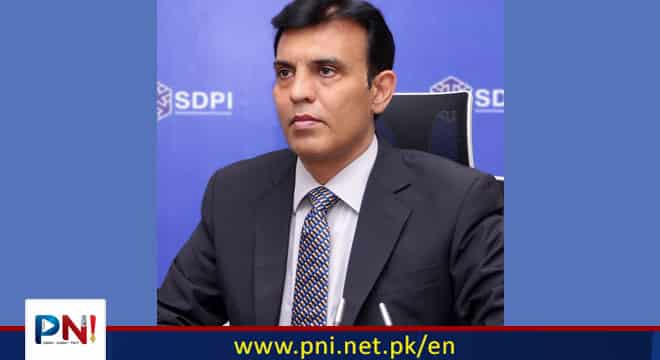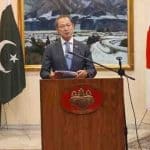ISLAMABAD, Dec 2 (APP): Executive Director of the Sustainable Development Policy Institute (SDPI), Dr Abid Qaiyum Suleri on Saturday said the climate debate at the biggest environmental conference, COP-28, has gained momentum amid increased discussions on Loss and Damage Fund (L&D Fund), just energy transition and climate finance. The SDPI Executive Director who is at present in Dubai, UAE to attend the 28th Conference of the Parties (COP-28) to the United Nations Framework Convention on Climate Change (UNFCCC) meeting being held annually.
Talking to APP, Dr Suleri said the discussion at COP-28 is also critically important because of the first-ever global stocktake (GST) of the nationally determined contributions (NDCs) pledged by the nation-states under the Paris Agreement in 2015 which will be the evaluation of the progress on those goals. “One thing is clear the global targets to limit the world average temperatures to 1.5 degrees Celsius have not been met so far through carbon emissions’ reduction. It has been deeply realised here at this forum that it is mainly due to the fossil fuel-based economy and human consumption patterns,” the SDPI Executive Director said. Commenting on the ongoing COP process, he said there are three terms used at the forum: “One is fossil fuel phase-out, fossil fuel phase down, and just energy transition.” He said the energy transition is discussed by countries like Pakistan who have vowed to reduce their reliance on fossil fuels by phasing out coal, and crude oil usage.
However, these countries also argue that this transition could not be achieved overnight and has a cost and it will be financed by whom. The developed countries, he said are against the energy transition whereas the petroleum-producing countries are also against the fossil fuel phase-out. “In the previous COP-27 in Sharm el-Sheikh, the government of Pakistan and the former Climate Minister, Senator Sherry Rehman made a great contribution in the creation of a loss and damage fund. Although, the Fund got active at the start of the COP-28 and got pledges but from our (Pakistan) perspective these pledges are very minuscule,” he said. “I believe that it will reach nearly one billion dollars and these are peanuts keeping in view the devastation in Pakistan post-2022 floods that alone incurred $30 billion losses to the country and the one billion dollars pledges are very low for the entire world’s developing countries marred by climate catastrophes,” Dr Suleri said. Despite that, the SDPI Executive Director said the Fund has a historic significance as it has been a longstanding demand of the developing countries for the past many decades.
The fund not only was created but is going to be made operational under the supervision of the World Bank and after four years it will be reviewed to replace its position. “The developed countries demanded the fund to be placed under the World Bank whereas the least developed countries believed that the fund would become like IFI (international financial institution) and demanded the UNFCCC to devise a separate mechanism for the Fund. Pakistan took the middle situation here, advocating, to first place the Fund under the World Bank for some time and then should be made independent after becoming operational after some time and many other countries supported Pakistan on this as this mechanism has been adopted,” he said. Other than the Loss and Damage Fund, he said the Global Climate Fund (GCF) is also receiving pledges as the US has pledged $2 billion, adding, “But the 2020 target of $100 billion gap is still not met and countries like Pakistan are pushing the larger emitters to fully contribute in L&D Fund and GCF who have a historic role in increasing global carbon emissions.
Apart from this, there were Adaptation Plan negotiation stream was also under the global discussions whose contact group meeting has started. “In adaptation, you learn to live with climate change, conform policy measures and lifestyle according to it and mitigation is to take measures to reduce losses due to climate change-induced disasters.” The negotiations, he said will look into the commitments made by the countries in their adaptation plans during the discussion. “The mitigation is a costly business.” Adaptation, he said is pre-incident compensation and mitigation is post-disaster compensation which is more visible and the rich countries are focusing more on mitigation funds whereas Pakistan demands to take both adaptation and mitigation simultaneously. The third important thing, he said is renewable energy transition.
“The G20 countries in its meeting in New Delhi a few months back discussed to increase renewable energy share by three times which is being debated here at COP-28 to how to increase the renewable energy resources and its share in the energy mix.” These are the three main pillars of COP-28 negotiations and historically COP decision-making process goes beyond 12 days whereas nine more days are left and it may extend beyond that, he added. Commenting on the activities held at the Pakistan Pavillion, Dr Abid Suleri said a panel discussion on the Living Indus Initiative was held participated by the Caretaker Prime Minister and WWF-International President, Dr Adil Najum spoke extremely well on it.
He added that the Recharge Pakistan project was also discussed, whereas a dashboard was inaugurated by the Prime Minister to provide forecasts at the division and district level in Pakistan indicating climate data on rising temperature and precipitation hotspots by 2048-2050 developed by the Ministry of Climate Change and Environmental Coordination. Dr Suleri said, “Although L&D Fund initiated which is good but its volume is not 10% of the total losses of Pakistan alone and under these commitments that are very low, “we will have to scale it up further.” Renewable energy, he said it is the future of the country and it would have to switch over to renewable energy as it would significantly impact the import bill of the country and also enhance its renewable energy share.
Follow the PNI Facebook page for the latest news and updates.









